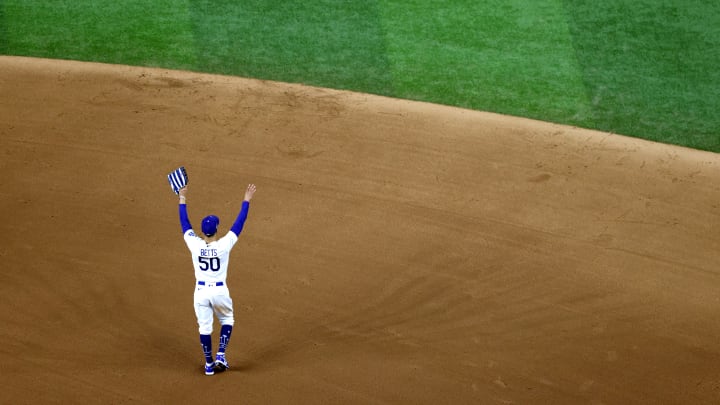A decade later, looking back on the contracts of Bryce Harper and Mookie Betts
By Mark Powell

Mookie Betts and Bryce Harper are forever connected by both position and finances.
Three pennants, two championships, one MVP -- it's safe to say Betts has delivered upon the promise the Los Angeles Dodgers saw in him when they signed the then 27-year-old outfielder to a monster 12-year extension in 2020.
The Dodgers' risky proposition paid off, but would it have happened without the precedent set by Bryce Harper just two offseasons prior? Harper inked his 13-year, $330 million deal in 2018, setting a precedent not just for overall contractual value for outfielders, but also the length of said contract. What made Harper's agreement with the Phillies even more impressive was the now-proven collusion between owners across baseball to try and limit spending, which the Scott Boras Report made public in 2023.
Despite promising Harper they'd be willing to spend on a winner in Philadelphia, Phillies ownership has shown inconsistent follow-through. John Middleton was willing to let J.T. Realmuto walk after so-called "failed negotiations" in the 2020 offseason, and also made little effort to bring back Aaron Nola in 2024. Meanwhile, Rhys Hoskins is tied to Philadelphia along with Harper, despite their infrequent contender status in the National League.
Betts' tenure with the Dodgers couldn't have gone better. Even with Clayton Kershaw retiring in 2025, the Dodgers kept their core around. Cody Bellinger avoided arbitration in 2021 thanks to a monster 10-year extension in the mold of Betts' deal. Gavin Lux signed through 2031, and Corey Seager didn't move on to the division-rival Padres until just last year. It's been a dream scenario for Mookie.
On a league-wide scale, Betts and Harper, along with the likes of Manny Machado and Mike Trout, took player salaries to the next level in the late 2010s which eventually took hold by the mid-2020s. Look no further than the monster deals given out to Bellinger, Fernando Tatis, Jr., Ronald Acuña and many of the game's elite.
While there is no salary cap in MLB, the luxury tax for the 2030-31 season is $245 million. That's a $37 million increase over the last decade, and a sign of baseball's growing influence around the world.
When Harper and Betts signed their deals, they made up upwards of 13 percent of the salary of the entire team. That's gone down a full percentage point since 2020, and while that doesn't sound too significant, that $2.5 million is enough to sign another middle infielder on a prove-it deal, just as an example.
The Dodgers have used this to their advantage, restructuring Betts' deal enough to surround him with talent in the waning years of his Hall-of-Fame career. The Phillies took a different approach with Harper, who agreed to a Bobby Bonilla-style contract which will pay him out as a member of the organization until 2040 in an effort to save the Middleton family money in the interim. Sadly for Bryce, very little of that financial flexibility has been used to build a contender in the City of Brotherly Love.
At 38 years of age, neither Harper or Betts are the players they once were. Their impact on the game, however, is everlasting.